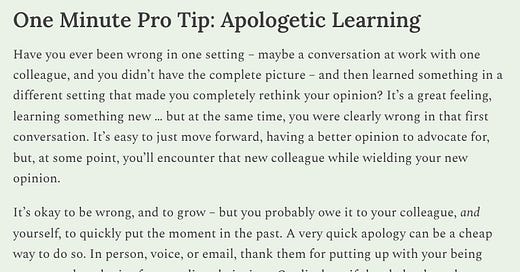Turnaround Can Be Fair Play ... Or Not
Sometimes, you have to change your mind, because you were wrong. But sometimes we change our mind because it's the current fad, and we should ask if we're right.
Leadership Moment: Return to Office
It seems like every time I turn around, I’m seeing another article on large company “return to work” programs. I hate that phrase – it implies that people who aren’t working in a specific office aren’t, well, working. For some companies, being in the office is already happening – a lot of my Israeli colleagues, for instance – and often for good reason (home office space is a luxury in much of the world).
Julie Bort has an excellent rant against the return to the office movement, and, if you’re a decision-maker in a company, it’s worth a read, so you can ask yourself why return to the office is so important. For some staff, the option is necessary. If my kids weren’t in high school and already ignoring me, I’d probably want an office far away from them, too. But as a mandate, do you actually have the tools to understand and measure the costs and benefits of return to office? Or is the push more of a return to the semblance of control?
One Minute Pro Tip: Apologetic Learning
Have you ever been wrong in one setting – maybe a conversation at work with one colleague, and you didn’t have the complete picture – and then learned something in a different setting that made you completely rethink your opinion? It’s a great feeling, learning something new … but at the same time, you were clearly wrong in that first conversation. It’s easy to just move forward, having a better opinion to advocate for, but, at some point, you’ll encounter that new colleague while wielding your new opinion.
It’s okay to be wrong, and to grow – but you probably owe it to your colleague, and yourself, to quickly put the moment in the past. A very quick apology can be a cheap way to do so. In person, voice, or email, thank them for putting up with your being wrong, and apologize for spending their time. Credit them if they helped you learn, or someone else for bringing something to your attention.
Appearances
Recently published
Blog Talk Radio: The Perkins Platform
CISO Series: Please Take Some Pens and Our Company Data On Your Way Out
Future appearances
Sep 20: SANS CISO Roundtable
Sep 20-22: HexCon 2023, Four Dimensions of Building a Security Program
Oct 20: Triangle Infoseccon, Leadership Track
Oct 25: SIM Summit Boston, Cybersecurity Panel, Author’s Corner
Interested in having me speak at an upcoming event? Contact me via speakers@duha.co.
Chapter Cameo: Unsolicited Apologies
Chapter 8 of 1% Leadership, An uncompelled apology unburdens everyone, is a skill I learned to practice early in my career, do develop a reputation of always being right. I wasn’t actually right significantly more often than I was wrong, but I learned that quickly admitting to being wrong, with a light apology, would often cause people to entirely forget I had been wrong in the first place. Peers would exclaim when they caught me being wrong, because they perceived it happening very rarely; but key to being wrong was quickly moving forward - so I couldn’t dig in my heels to argue if I was sure, but, more importantly, by apologizing in a small way for being wrong, I made it hard for others to invest energy in pointing out that I’d been wrong … after all, that would just be rude, wouldn’t it?
Leadership Q&A: Interpreting a Mandate
Leader B asks, My employer is mandating that everyone within an hour and a half drive return to the office at least three days a week. This isn’t a problem for me – I’ve been enjoying the quiet of our office building for months now, and the amenities are quite nice, especially when only a few of us are around. But many of the people on my team will have a harder time of it, and many have been openly complaining, and I suspect we’ll lose some folks who are right on the boundary of that commute. How can I make this more palatable to them?
It’s a painful conundrum you find yourself in, B, and one that a lot of your peers are also experiencing. I think there are a number of ways to approach this.
Keep reading with a 7-day free trial
Subscribe to Duha One: Leadership in Minutes to keep reading this post and get 7 days of free access to the full post archives.



